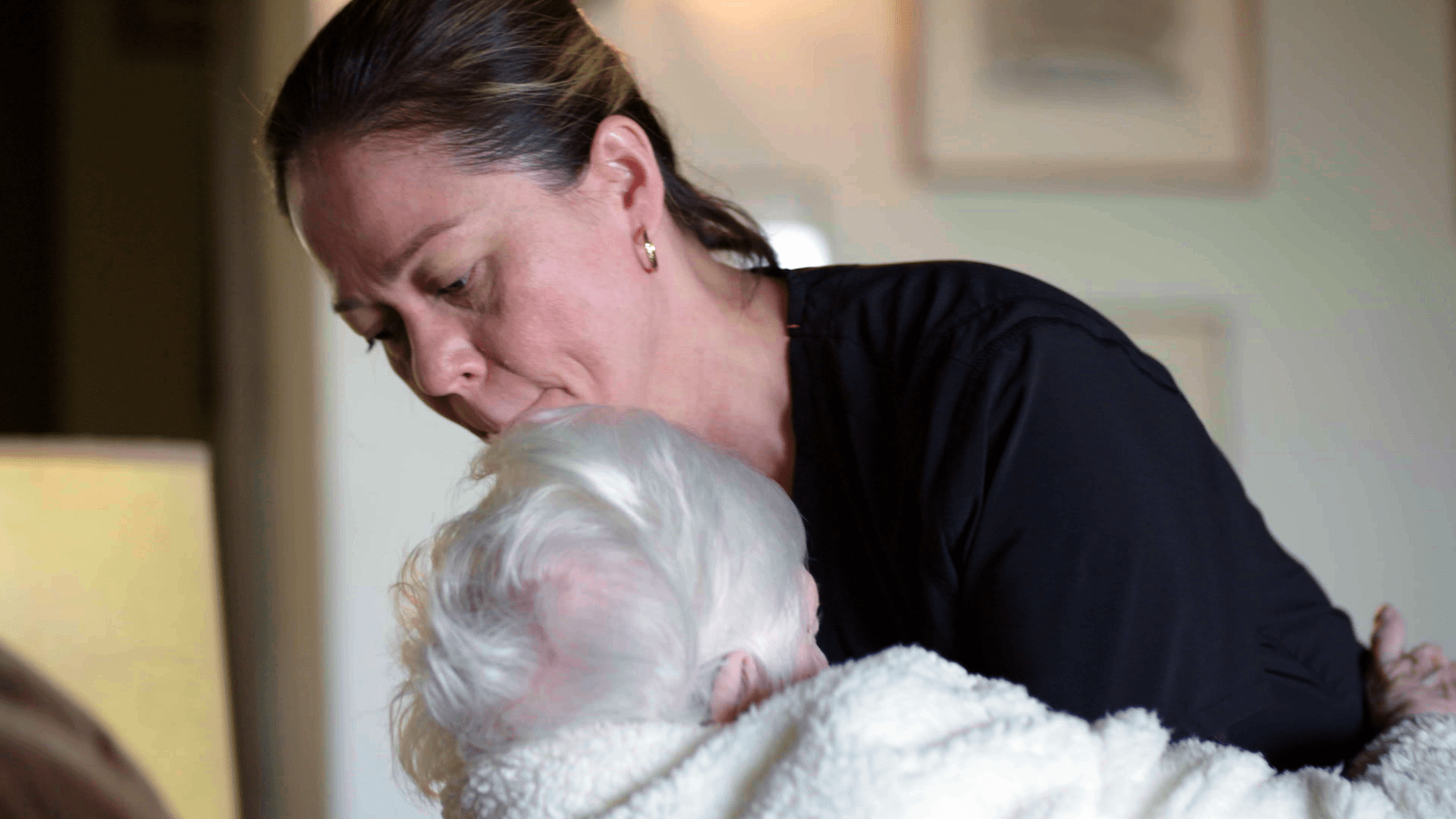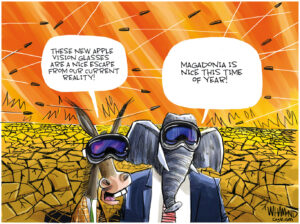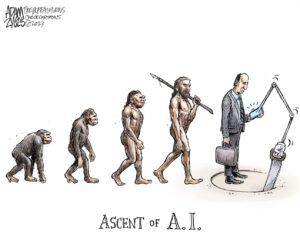The Nationwide Scandal Hiding in Plain Sight
Lax regulations have enabled the egregious exploitation of residential care workers, reveals Emmy-winning journalist Jennifer Gollan. Rachel de Leon / Reveal
Rachel de Leon / Reveal
Listen to the full discussion between Scheer and Gollan as they talk about the operators, exploited workers and regulators who have had a role to play in the rampant abuse of workers taking care of the most vulnerable members of American society.
Robert Scheer: Hi, this is Robert Scheer with another edition of Scheer Intelligence, where the intelligence comes from my guests. In this case, it’s Jennifer Gollan, a reporter, prize-winning reporter, for Reveal, the radio product of the Center for Investigative Reporting based in Emeryville, California. And this is a series about the shabby treatment of seniors in need, medically infirm; sometimes they pay a lot of money for this shabby treatment. But it is a mark of the moral insensitivity of current American society that we rely so heavily on the most exploited and insecure sector of our workforce to provide the primary care for the most vulnerable sectors in the population. I’m speaking of childcare, which often comes from undocumented workers who are very vulnerable, exhausted, and poorly paid. And a less-noticed area is the treatment of seniors, very often in advanced stages of illness or with signs of dementia and what have you. And a series that Jennifer Gollan did devoted to the treatment of the elderly, basically in makeshift homes or care centers where up to six people are cared for by basically vulnerable, undocumented workers; in the cases we’re going to be discussing, often from the Philippines. And there’s a fairly Wild West kind of scene where there isn’t regulation, and people are exhausted, and the care is not delivered of the sort that one would expect in a decent society. And we’re talking largely about California; I forget, there was a statistic in your story that–I mean, a lot of the–here’s a progressive state, deep blue and all that. And yet basically, people working in caretaking of others–just to set the stage, these are basically, were private residences; they have about eight people, seniors; a family is paying for this, or some program. And poorly paid people are washing, bathing, diapering, doing everything to keep them alive and secure. And they’re ripped off, generally, and a lot of them are Filipino immigrants. Do I recall that correctly?
Jennifer Gollan: That’s correct. So in states where there are large Filipino populations, including New York and California, many of these workers are taking these jobs basically in the shadows. And this is an underregulated industry, where they’re non-medical and they’re referred to as assisted living facilities, or board and care homes, or elder care facilities. And they provide this around-the-clock service for seniors, and help with daily living tasks. And they’re cheaper alternatives to nursing homes, so they’re really attractive. But the thing is, this industry is so diffuse, these homes blend into your neighborhood and mine, and you would never know that these care homes are actually employing many immigrant workers. And oftentimes, we found, are paying them just two to three dollars an hour to work around the clock for years on end.
RS: So wait a minute. Are these documented immigrants, or are they here without documentation, or–?
JG: It’s a mix. Some are undocumented, and some do have their papers, but it’s really difficult, you know, if you’re trying to support a family back home and you don’t have medical training to say go work in a nursing home or a hospital setting. These care homes provide, you know, a steady paycheck for so many workers. And for undocumented workers, what we’ve found is it really puts them in a very vulnerable position where they’re often underpaid, and they’re afraid to speak out, because they don’t want to lose their jobs. Their bosses often harass or threaten to fire them, or worse, report them to immigration authorities.
RS: You know, you’ve had so much experience with this that I just want to stretch the argument, if I can, or the discussion. Because we talk a lot about immigration, and Trump is obviously, you know, cracking down in very bad ways at the border. But of course he’s not the first; Barack Obama deported a lot of people. And the argument used to be an argument that even democratic politicians accepted, is that if you have people coming in without documentation, you undermine the wage structure. And you seem to have an example of that. If people are working for two, three bucks an hour, that’s what we’re paying–or the Chinese are being paid by Apple in China, right?–to assemble iPhones and so forth. And so we’re really talking about–for certain services which we can’t export, obviously, if you’re going to take care of the elderly, or a lot of the service industry, people cleaning houses and so forth. We have relied very heavily on an easily exploited workforce that does not even get paid the legally mandated minimum wage, whether it’s federal or state. And in California, it’s quite a bit better now than the federal. And if they complain, they can be turned over to authorities. So you really just reported on the, you know, the pre-Trump drama. It wasn’t so great in the old days. We had a lot of people working here who were being ripped off. No?
JG: That’s right. And we still do. And today, it’s even worse. And we notice this–I mean, it’s especially acute when you’re trying to report on a story like this, and you’re asking people to go on the record and recount how they were exploited. People are so afraid these days, and they’re–it’s just so much more unpredictable for workers in this industry. Because they know that if they put their name to their story, they could very well be putting themselves and their families at risk, and they’re afraid of immigration authorities. So it made it very difficult to report the story to begin with. And, ah–yeah.
RS: But let me ask you–I don’t mean to interrupt you. But I mean, I just want to get sort of a handle on the bigger picture. Because this is a story that your organization, Reveal, at the Center for Investigative [Reporting] seems to repeat. This happens in the high-tech industry, it happens–in your case, you examined shipbuilding and, you know, traditional activity. And there’s a lot of the two-class system. We have an elite class; in a place like California, people getting the higher-end jobs at Google and other places like that. And then you have this mass service and–economy, and then some exploited industrialization, and some farm-working, where people are basically living in a Third World environment. And you could even extend that into the gig economy that you have reported on, where suddenly we have forgotten about all the gains of the labor movement, and operational safety, worker safety, and everything else. And we have, basically, a Third World workforce. And in reading and viewing, listening to your audio reports on it, you basically were describing an exploited Third World labor force. Was that not the takeaway?
JG: It’s true. A lot of these senior care homes just fly under the radar, because there are so many, they blend into neighborhoods. And you know, many lawyers and elder advocates will tell you that it’s just that the regulations are so lax. And it’s because the regulatory oversight regime is complaint-driven here; that is, state and federal regulators are really only responding to, for the large part, to complaints from workers or advocates. So the oversight here is the problem, is lax; and then driving this as well is operators. They know they can suppress workers’ wages, and then take in $4,000 a month from seniors and, you know, make up the difference. And there are many, many entrepreneurs on YouTube promoting this business in particular as a money-making machine. And a place where you can get into the business, the real estate end of the business, flip a house, make a few adjustments, and care for a bunch of seniors, open a care home and make a lot of money.
RS: Yeah. I mean, give us a sense of the reporting you did. Because I found it quite compelling. You had some, a woman in, I think she was in Beverly Hills, who runs a number of these things. And you tried to reach her, and she–and then you had some motivational speaker who told people how to rip off and how to do it. And it all basically had to do with, at the end of this food chain are people who are not getting the healthcare or the care they deserve, right? They’re not, they’re being abandoned, they’re being tended to by workers who are working very long shifts, and then they get resentful. So it’s not a successful system by any standard. And yet other people are willingly putting their grandparents in these places, or their parents, and then what, walking away from it? I mean, why did it take you, and the group that you work with on this story, to care? Why haven’t I heard about this before?
JG: Well, it’s a good question. I think a lot of these workers are, again, working in the shadows. And part of the issue is lax enforcement, and another part of the issue is greed. And I don’t think this industry has gotten the attention it really deserves. The data that we looked at goes back at least a decade, and we can see that there’s been rampant exploitation, record-keeping, overtime, minimum wage violations going back 10 years across the U.S., in nearly every state. And so the problem here is, you know, should there be–there are many questions that come up. Does it require stronger enforcement or oversight? Should maybe state attorneys general get involved, and crack down on the industry to clean it up? Or is it more legislation, to tighten up oversight of the industry? I should point out that to open up one of these care homes, you have to have more training to be a manicurist than you do to open up one of these senior facilities. And these facilities, because regulations have been relaxed over the last 15 years, are taking on increasingly ill patients. So we’re talking about hospice and dementia patients, which require 24-hour care and attention. And that’s what these senior facilities are promising, but it’s at the expense of these workers.
RS: Well, first of all, you mentioned the figure $4,000 a month. That–where does that come from? Is it a Social Security check? Is it, is there government money going into this, or–?
JG: Well, so that’s the median cost per resident to stay in one of these care homes per month. So these care homes can often make, from six residents, about $250,000 a year. And so you can see why it would be quite lucrative. And they’re basically promising to provide all of the care that many, you know, working parents cannot provide to their parents, because they’re caring for their children, for example. So they’re filling a need, and the industry has grown incredibly over the last decade, and they’re taking on these increasingly ill patients.
RS: It’s interesting, when you say lax regulations–so let’s take a place like California, which has been run during this period, I guess you said the last 15 years or so, by people who consider themselves progressive, right? I mean, Jerry Brown was a fairly enlightened governor in his third and fourth term; he’d run the state for another eight years. As I said before, a deep blue state. And why does this situation continue? First of all, why do the children of these parents put up with it? Do they know what’s going on? Why isn’t there more regulation? Kamala Harris, who’s running for president now, was the Attorney General during much of that period in California. Why didn’t they act on it?
JG: Yeah, there have been actually some quite serious cases. One, in fact, is a case that the California Department of Justice is currently prosecuting. It involves a chain of care homes and childcare facilities in South San Francisco where prosecutors allege that workers were working around the clock for just two dollars an hour. And in some cases, they had their passports withheld. And this is a human trafficking case. These workers were not allowed to leave these facilities. And so going back to the question of enforcement, there are laws on the books that would hold some of these operators accountable. For example, there’s the Fair Day’s Pay Act, which became effective in 2016. And it basically said the Department of Social Services, which oversees licensing of these senior care facilities, that it empowers them to revoke the licenses of operators that have outstanding wage theft judgments. But what we found is that there are at least 20 companies that are still operating despite outstanding wage theft judgments, and that means they’re operating illegally. But the Department of Social Services, when we took these findings to them, told us that their hands are tied. That they cannot do anything unless it’s a health and safety issue that poses a risk to a resident, let alone the workers. So this is an area where, you know, there are laws on the books, but regulators aren’t enforcing them.
RS: And the people don’t complain because of questionable status, immigration status?
JG: That’s often the case. And they can’t afford lawyers to hire, you know, to go after these operators that have basically stolen their wages. And these companies are still in business, often under the same names. And they still owe these workers tens of thousands of dollars in back wages.
RS: So you’re describing a Dickinsonian world. You’re–this is, two dollars an hour–you’re going to sink deeper into debt in California even if you work all the 24 hours. And in your reporting, you describe people just working around the clock, which is not good for their patients; they’re going to be irritable and not functioning well. But we, you know, we’re very critical of, say, the wage rate in a place like China, but what is two dollars an hour? That’s their wage rate, and our course of living is a lot higher. How do these people get by?
JG: I mean, in many cases, these, some of these workers are grateful to have a job. They’re grateful to be able to send a paycheck back home to support their children. But the way that this, that these operators conduct themselves and treat their workers is abysmal. These workers are often sleeping in garages, or on the living room floor, or next to their patients. And we spoke with at least two workers who had miscarriages because they had asked for time off, but they said their bosses refused. And they believe that they lost their fetuses because they were being overworked. And these are–this is just, you know, a small–these are but small examples of the kind of treatment these workers endure. And–
RS: Yeah, go ahead.
JG: And, you know, in many cases, they don’t feel like they can speak out.
RS: Because, what, they just lose the job, or they would get deported, or–?
JG: Exactly. They’re afraid of losing their jobs, and they’ve told us that their bosses have threatened to fire them. And in some cases, you know, when workers filed a wage theft claim, in one case we found the operator actually installed surveillance video cameras to keep an eye on the workers. And it’s not just the workers who are at the receiving end of some of this treatment; it’s labor investigators as well. In one case, we found labor investigators went in and, you know, the operator got on the telephone with the investigator and shouted at him to leave, and called the police.
RS: Against the state labor investigator?
JG: This was a federal labor regulator that had gone in to investigate. And the operator basically, you know, was incredibly confrontational.
RS: We’re going to take a break now for a minute, but I don’t want to lose the sort of moral tension here. You can’t live on two dollars an hour and still send money back to the Philippines, and still not go crazy, and take care of yourself and have medical–I mean, you just can’t do it. You couldn’t do it in Dickens’ England, and you can’t do it now in Southern California or anywhere else. And so the idea that this continues–it’s not covered, I guess, by television. Until you came along to do your series–right?–I had never heard of this. Has there been much response to it, is there a cry for new legislation, are there hearings?
JG: There has been. We’ve heard from some state lawmakers that they’re mobilizing for the next session to write some legislation to clean up the industry and protect workers. And we’re hearing from some federal lawmakers that they are taking a close look at this. So we’re just waiting to hear some details on what that’ll mean for workers.
RS: OK, well, let’s take a break now just for a minute, for stations that want to run this. And we’ll be right back with Jennifer Gollan, who’s done–who’s an Emmy Award-winning reporter, and now works with Reveal, and did an incredible–or was part of a team that she led doing an incredible job on something that’s just so far below our radar that we don’t even notice it, and maybe we don’t notice it even if our own grandparents are being victimized in this process. [omission for station break] We’re talking about the care of elderly people by exploited workers who seem to have no other choice. And I want to cut to the chase here, because we’re very self-righteous these days about immigration. And yet we’ve had this problem of people getting into the country without status, not having reasonable quotas of what workers we need, and giving them full legal rights, and until recently most people didn’t think about it much. Yet they got their cars washed at places where people were making miserable wages; they had people raising their children who, because they didn’t have documentation, had to put up with terrible working conditions. And in the case of this series that you’ve done on care of the elderly in these care homes, you know, it’s another example of that. And that’s not a problem that’s just post-Trump. That’s a problem that’s, I suspect, been–it’s been growing, but it’s been going on for what, 50 years, right?
JG: It’s true. It’s not just car washes or nannies; it’s restaurants, it’s so many low-wage industries. And these workers are basically relying on regulators, but the problem is when it comes to labor violations the oversight is really driven, and enforcement is really driven, by complaints. And so many of these workers, because they’re undocumented, don’t feel empowered to come forward. They’re afraid of being fired or reported to immigration authorities by their bosses. And so it’s a system of silence, and they’ve essentially, this industry in particular has worked out very creative ways of exploiting loopholes. And in the case of the senior care home industry and these smaller operators, we attended two workshops where we saw this in action. And they were essentially encouraging operators to get into the business, and basically walk up to the line of what’s legal. They told them they can use one caregiver for six residents, for example, and if you use one caregiver, then they’re not allowed to leave the facilities for breaks or rest times. And that essentially gives them full coverage for the 24 hours for their residents. And things like that, that they’re allowed to have them sleep in the garage, and you know, basically how to save money on payroll.
RS: OK, but what I’m asking is, where were the adults watching the store? I mean, you know, fortunately we have Jennifer Gollan, and we have Reveal, and we have people. And you do a great job, multimedia, you did a terrific radio report on this. It was picked up, right, by the AP, and they did a good job of getting it out. And but my question is, first of all, sadly, is anything going to happen as a result? But more, even more basic, this has been going on for a long time. And where are the other journalists? And where are the legislators? Why aren’t they more proactive, you know? Why haven’t they been looking into it? Did you challenge any of them about it?
JG: This is a really good question, Bob. I mean, these workers in this particular industry are not unionized. So they’re relying on worker advocacy groups to represent their interests. And these worker advocacy groups are so overburdened with cases where they’re representing workers who have been underpaid and overworked. And you know, it may be that those advocacy groups aren’t as powerful as lobbyists for industry. And the industry has very powerful, well-paid lobbyists and lawyers who are in Sacramento, and it’s just, it may be a case where they’re outgunned. Labor regulators tell us that they rely on complaints to go after exploitation, for the most part. And when we took our findings here to, say, the U.S. Department of Labor, there was no, at least public expression of plans to tackle this issue, even though this has persisted for at least a decade. So these are questions that we’re now posing to state and federal lawmakers, is you know, if the main front-line regulator isn’t taking on this issue, then who’s going to take charge of this?
RS: You know, I was working at the LA Times before you started there. And I covered some of these issues, and I agree there’s always a different twist to it. You know, in this case, you’ve got these sort of independent caregivers, and pick up a residence and put six people in or more, and can skirt around the law. But the basic issue is that many people who are more affluent are happy to have cheap labor, including when they park their parents or grandparents in some home–oh, it’s probably wonderful, they got dementia, who cares anyway, or something like that. There’s a heck of a lot of cynicism in all this. And what I loved about your reporting is you challenged it. You know, you knocked on the door of a woman who claimed she was doing something wonderful for ill, older people. Right? And then you attended a convention or a meeting where this motivational speaker talked about the proper way to frame this, and push it, and so forth. And I guess I’m asking a question–you know, because journalism is about searching for truth and accuracy. Do we have whole industries of PR people, and other people around, who are basically out to conceal immoral situations and exploitation, and get away with it? And politicians who take their funding and look the other way? Isn’t that really the big story here?
JG: I think one could draw those conclusions. I think for me as a journalist, it was difficult to square, you know, the operator’s expression of compassion for older people while their workers were not earning minimum wage and sleeping on the floor, for example. Or who were afraid to speak out–in some cases, afraid for their lives. And it was shocking to encounter conditions like this in America. And it just–it goes to this other, larger issue, which is, how are we going to care for the growing population of seniors that will soon outnumber children in this country? It’s something that we haven’t grappled with like many other countries have, as far as providing sound, basic care for our loved ones. I mean, when you speak with the industry, they said that maybe it’s just a few bad apples, and that they’re trying to do these workshops to educate care homeowners. But when we attended the workshops, they were encouraging them to exploit loopholes.
RS: Yeah, and you got that on tape. But I’m just–I want to cut to these legislators, because we’re letting, we tend to let them off the hook, and they always talk a good game. But if it requires more of a background check and testing to deal with someone’s nails, and a much lower level of expertise and knowledge to take care of people around the clock who have serious, you know, illness and aging, and you know, can’t control their bodily functions, and are maybe losing their sense of who they are and where they are. You know, so it’s not only the people who are taking care of them, and who get exhausted and angry or can’t deal with it, or are not equipped to deal with it. It’s the patients, it’s these people who are supposedly being given care. So regulation of such an industry would seem to be vital not just for the workers, but for the people that they’re taking care of. And there doesn’t seem to be any of that. Or am I exaggerating?
JG: It’s true. As you say, you know, when you speak with workers and worker advocates, one of the first things they say–and also senior advocacy groups–one of the first things they say is that if you have workers who are working around the clock, for a pittance, it will affect patient care. And there is some more reporting that we’re going to come out with where that is certainly the case. And it’s up to these lawmakers to sort out, how can we better protect both of these vulnerable populations–workers and seniors–to make this industry accountable to both its clients, but this whole cohort of workers who are propping up the industry. I mean, in many cases, when operators were questioned why they’re paying their workers two dollars an hour, they said that that’s the going rate, so that’s why they were, you know, violating minimum wage laws. And this is something that can be fixed by lawmakers.
RS: Well, it can! I mean, it should be a serious felony to pay someone two dollars an hour. What are we talking about? We have–we have minimum wage requirements. Obviously we don’t enforce it; obviously, there’s no punishment for it. And this has been going on a long time, but the idea that someone in, you know, a prosperous area of California is paid two dollars an hour–and that legislators don’t talk about it, do anything about it, there’s no pressure. I want to end this, because I’m always looking for role models, and I have such respect for the work that you did on this story and on others. And I’m talking to Jennifer Gollan, who is–I shouldn’t have to say it, Emmy Award-winning reporter for Reveal, Center for Investigative Reporting. But you know, there’s passion in this reporting. You meet these people, you care about them, you hear their voices. And so I’m here at the school where you got your master’s, at the University of Southern California. And I look around at what we teach and what we do, and we teach lots of things. We teach public relations; we teach writing, making apps; we teach all sorts of things. Are you the odd one out, or are you representative of a new generation of journalists who are going to care about what happens to the most vulnerable? Somebody once said the purpose of journalism is to comfort the afflicted and afflict the comfortable. Did you get that at school? Where did you get your moral conscience from in journalism?
JG: For me, I grew up with Australian parents in the U.S., and I always felt like I was, we were a little bit outside the norm. Because there was always, you know, my parents’ sort of traditions and cultural norms, and they were different. We came, my dad came over on an H-1B. So I think also, you know, because my folks were interested in news from abroad–from back home, from England where, you know, we had lived for a time as well–they’d discuss the news, and they cared passionately about how people who really came from very little, how they were being treated. And I think USC only accentuated that sort of experience for me; I really was so inspired by the professors there, and as far as, you know, chasing down revelatory information, informing the world and making the world a better place by exposing the truth. And I think it’s just those fundamentals that I have sort of held dear. And you know, it’s at the Center for Investigative Reporting that I’m so privileged to do this kind of work. And it’s something that, I think it is part of–you know, there’s a–it’s more important now than ever, because of, you know, our polarized society, our politics, the mass of information that’s available, not all of it truthful. And I think it’s our duty to expose the truth, to keep a level playing field, and for people to be informed about how the world works.
RS: Well, you’ve just made me feel a lot better about the place where I work for my day job. But I’m going to end on an editorial note. First of all, let’s tell people how to get your series. It’s at revealnews.org, right? Any more specific information?
JG: That’s right.
RS: And what I love is the–I just want to end on sort of a high-tech thing here. You guys have mastered, or you’re particularly good at radio, and you actually do video and so forth. But I thought, wow–for the first time I really believed in something we do teach here at USC, the whole multimedia approach, and using social networking, and getting the word out. And your series got that kind of attention, because you do have that skill set, right? This is a new kind of journalism, in a way.
JG: It’s true. It’s true, I feel like, you know, in today’s media landscape so many print reporters, or traditionally print reporters–I’m using quotes–or web reporters, are doing radio work, and also television. And there are so many different ways that those platforms can inform the reporting for the other one. And I think it’s just, it’s a great reflection on USC’s program, but also the changing landscape of journalism today. Just so many more reporters are multi-platform reporters who also do data. And it’s just a, it’s an incredible time to be a reporter.
RS: Yeah, and I hope you can make a living at it. [Laughs] Because I think the–
JG: I do, too.
RS: –the business model is in a bit of trouble. But I do want to end this with that quote, and it’s been attributed to many different people. But the role of the journalist is to comfort the afflicted and afflict the comfortable. I don’t want to lose that second point. And your series does both. It tells us that there are people, both the workers in these care homes and the seniors that are being supposedly cared for–they’re the afflicted. And good journalism will bring comfort, will bring exposure, will bring assistance to them. But you also have to afflict the comfortable. And frankly, I felt considerable rage after reading and following your series. I couldn’t believe it, that people are making two, three bucks an hour, legally–or not legally, but they get away with it, being paid that–in California, you know. I don’t even know how they go to McDonald’s after, they probably can’t even pay for [it with] what they just earned. And it’s amazing to me that in a state–and I keep harping on this because it’s important–a state that prides itself on being progressive, enlightened, which has incredible wealth, incredible wealth, that we’re paying people and getting away with it, two dollars an hour to work around the clock, sleep on the floor, diaper these seniors, care about them, treat their skin wounds, surface wounds, all of which you described in this thing. And when they object that they’re not getting their pay that they’re entitled to, they get turned over to immigration, they get threatened. I mean, you know, in this discussion I think–people have got to check it out, because I think we’ve lost a little bit of the power of your series. And why don’t we close by you telling me what was most disturbing or moving that you encountered reporting this story?
JG: Well, there are two things. One just sparks shock, and that is when these operators are caught underpaying their workers or not paying the back wages, they just abandon the company name and start a new one. And it’s a matter of filing a quick form with the California Secretary of State’s Office, and they’re off to the races; they’re still in business, and the workers are just expendable. And I think the other shocking thing, and inspiring thing, is how compassionate these caregivers are. Even though they are way underpaid and overworked and mistreated, they care for the residents in such a deep, profound way. And it literally, I am guessing, extends the life of these residents, to have someone who cares for you like family. And in some cases, instead of their family members coming to visit them. These caregivers are so fond, and have such a deep bond, with their residents despite their terrible conditions, and I found that just incredibly moving.
RS: You know, that has been the story of racial exploitation, immigrant, exploiting immigrants, throughout American history. There was always, yes, in the Deep South, the nanny who raised the children, and you could count on her to do the right thing by those children even though she was a slave, or she was held in a Jim Crow society, and exploited in every which way. And you hear that a lot about our immigrant workforce, you know? Oh, good people, and they show up, and they work hard, and they raise children, and they take care of the old, and so forth. In this case, you feature mostly Filipino workers–oh, they’re legendary, they come from a culture where they really care about other people, and so forth. And then what happens is these cynical SOBs rip off all those good intentions, those good feelings, those good concerns, right? And they buy off politicians, and they turn this into a greed industry, and they get away with it. And it didn’t start with Donald Trump; we’ve been ripping off the good intentions and hard work of immigrants and others in our society for the longest time. And two bucks an hour–anybody listening to this, think about it. In America, you’re paying people two, three dollars an hour to sleep on the floor and go around the clock taking care of seniors that have to be diapered. Think about that and what that says about our culture at this time. I want to thank you, Jennifer Gollan, for doing the hard work and breaking through to get this story for Reveal from the Center for Investigative Reporting. And our engineers on our end at KCRW are Kat Yore and Mario Diaz. And here at USC–where I teach, and where Jennifer Gollan got her master’s, and I’m very proud of the fact that we had something to do with your education–it’s Sebastian Grubaugh who has been our engineer once again from the Annenberg School for Communication and Journalism. And now I can say that with greater pride than I did coming in to do this show. So thank you again, Jennifer Gollan.
JG: Thank you very much, Bob. It’s been a great privilege.
Your support matters…Independent journalism is under threat and overshadowed by heavily funded mainstream media.
You can help level the playing field. Become a member.
Your tax-deductible contribution keeps us digging beneath the headlines to give you thought-provoking, investigative reporting and analysis that unearths what's really happening- without compromise.
Give today to support our courageous, independent journalists.






You need to be a supporter to comment.
There are currently no responses to this article.
Be the first to respond.